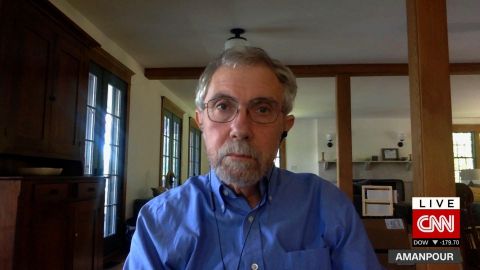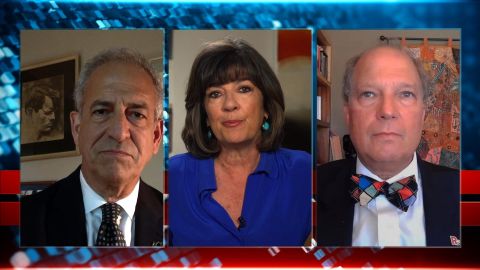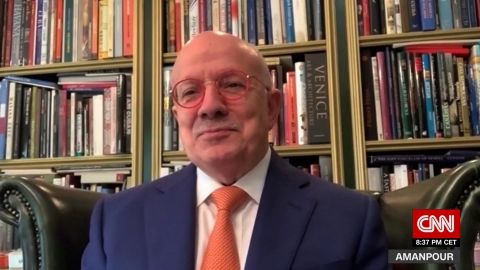Read Transcript EXPAND
CHRISTIANE AMANPOUR: The next COVID dilemma for the nation and the world is opening schools and colleges in the fall. Eduardo Padron is president emeritus of Miami Dade College in Florida,a state will set new records this week for single-day coronavirus deaths. His college enrolls more minorities than any other in the country. And here he is telling our Walter Isaacson why flexibility is needed to ensure that every student can get an education.
WALTER ISAACSON: Thank you, Christiane. And, Dr. Eduardo Padron, welcome to the show.
EDUARDO PADRON, PRESIDENT EMERITUS, MIAMI DADE COLLEGE: It’s a pleasure to be with you, Walter.
ISAACSON: You have been at Miami Dade College for 50 years now in various capacities, now emeritus. Tell me, what is Miami Dade going to do this fall?
PADRON: That’s a good question. And I wish I could tell you, because, frankly, it all depends on the spread of the virus at that point. Right now, in Florida, we’re going through some very, very difficult times. As you probably know, now Florida has surpassed New York in the number of COVID cases by about 3,400. So, it’s a problem. Our South Florida hospitals are at over 130 percent capacity, the ICUs are. And even last week, for example, the number of cases varied between 10,000 and 15,000 daily, and the average of over 100 deaths daily. So it’s a serious situation. So, if that continues, I don’t see how we can have anything other than remote learning coming — come September. But the hope is that it will improve. But it will have to improve significantly. And follow — we will have to follow the advice of scientists in terms of what is low enough to avoid the spread of the virus, because that is the real problem, students going into the classrooms and getting sick, and then coming home and getting the rest of the family sick. And nobody wants that to happen. The institution’s main objective is to protect the safety and the health of our students. So, that’s going to be the number one priority. And right now, the institution is planning for various possibilities, so, in-person learning, online learning, and a hybrid system of learning, in order to be ready for whatever is possible at that time.
ISAACSON: What transformations is COVID-19 having in the way we’re going to do college?
PADRON: Well, this pandemic — I’m the eternal optimist — will go away, and we will go back to a more normal life. But this is going to have significant impact. And I hope it will be, because what the pandemic has made so real is the consequences of inequality, and the consequences of lack of opportunity for people. And I think this is a great opportunity in America today to really think very hard about social policies, about how we invest our resources, and how we make sure that this country will never reach its full potential, will never achieve the kind of peace and the kind of pride that we need to have, as long as we exclude so many people from the mainstream — the mainstream economy. This is — these are values that are inherent in our Constitution. And we need to make sure that we bring them alive, and that we all work very hard to be able to make sure that every American is able to achieve the American dream.
ISAACSON: Well, tell us about your experience, your life path that takes you from Cuba to Miami Dade College.
PADRON: Well, I came to this country with a younger brother, three years younger, sent by our parents to the United States to avoid communism and to be able to have a better life in the United States. I was 15 and my brother was 12. And that was very great from our parents, because they didn’t know if they were going to be able to see us again, because it wasn’t — it was very difficult to leave Cuba. And so I think came to this country, and everything was new to me, the language. Everything was totally new. And my mother said something to me with tears in her eyes when we departed. And she said, no matter what happens, even if you go to bed hungry, the one thing you’re going to do in America is to go to college, because that’s the only real passport to a better life and to the American dream. And so I committed to do that, in spite of all the problems and difficulties in finding the money to be able to eat and support and so on. And I had three, four jobs. I was sleeping at that time about three hours every day only, because I had different part-time jobs and going to school. And, frankly, when I — I did one year of high school. And when I finished that, I said, well, I need to follow my mother’s advice to go to college. So, I applied to some of most — the best colleges in America. And one by one, I got a rejection letter. And someone told me that there was a school called Bay County Junior College that had just opened. So I went there. That’s today Miami Dade College. And that place changed my life. That place gave me a self-confidence, a self-esteem, and the support that I needed and the understanding that, yes, I could go to college and be successful. And the rest — the rest is history. And I have to tell you, it’s a place — and I call it the great experiment. It’s what I call democracies college. It has been referred to as a dream factory, because we’re serving mostly low-income people, immigrants, members of minorities. We graduate more minorities than any other college or university in America. So, it’s an institution that is what America needs the most today. It’s an institution that really has no pretensions of anything. We have an open door. We accept students where they are. All we ask is for them to have a high school diploma. But many of them come and prepare for college. You look at the zip code where they came, and you immediately know that they’re going to have — they’re going to need a lot of remediation. But that’s what we do best. We save a lot of lives that way that otherwise would be in the street corners. And to see these students grow and become presidents of the World Bank that we have today, or presidents of foreign nations, or the top doctors in the city and the top engineers, the heads of the major accounting firms, that is something that it’s America at its best. And it’s something that I think higher education needs to adopt more.
ISAACSON: When you say higher education needs to adopt it more, are you saying that the elite universities and selective colleges are not doing enough of a good job on social mobility, the way you just described Miami Dade College?
PADRON: Most definitely. And I will tell you why, Walter. When you think about it, our higher education system, which I’m very proud of in many ways, because I think it’s the best in the world — everyone in the world wants to come to America to study. And for most of the last two centuries, it’s a system that served us well. It was created to serve the needs of the elite, people of privilege, and that was OK. It was OK during that time — maybe not — OK is not the word, but it was OK. It was — we could accept that, because most Americans, even as recent as 40, 50 and 60 years ago, could go into factories and offices with little education, doing repetitive tasks, manual work, earning a good wage that would allow them to become middle class, buy a home, buy a car or two, and put their children through school. Today, that is not possible. Most of those jobs that allow people to do that have been disappearing. And with the advent of the technological revolution, the knowledge front, the ability of Americans to be able to join the middle class, achieve the American dream is very much tied to the ability to get a college credential. So, what I mean by that is, whoever doesn’t have a college credential in America today is probably destined to stay in a cycle of poverty for the rest of their lives. So, colleges and universities have a very important mission. We are about economic mobility. I’m proud that Miami Dade College, based on the cherished story of Stanford, very well-documented by “The New York Times,” is the number one college or university in the state of Florida in terms of promoting economic mobility, and one among the top four nationally. That is what every college in America should be all about it. Children from the lowest of the poorest populations in America, less than 50 percent of them ever go to college. And college access is highly, highly dependent on parental income. And we need to make sure that we make it affordable and we make it accessible.
ISAACSON: So, 100 years ago, when we entered a new economy, we decided to make high school universal and free for everybody. Should we be doing that now for college? And what do you think of Joe Biden’s plan and other plans to try to make higher education universal and accessible?
PADRON: Well, for the last more than five years, I have been advocating for universal access to college. And it’s interesting, because if we know that two-thirds of all the new jobs today in America require a post-secondary credential, right, if we know that, in order to navigate this economy, you need to have certain skills and certain sophistication and learning that was unnecessary before, it seems to me that we need to do that. We need to understand that talent is universal, but opportunity is not. So, it’s our responsibility to open the door of opportunity wide open to the masses that really need this in order to compete. Today, nations, states, cities compete on talent. And we need to harness that talent. And we need to make sure that colleges and universities assume that responsibility. Economic mobility is key, and it should be a major mandate of our colleges and universities assume. So, yes, I am in full support of the Promise that — College Promise program. I’m chairman of that board right now, which advocates for providing students free college in America. I think it’s the kind of thing that is really going to elevate our level of competitiveness. And when you think about it, that action after so much debate in America about 100 years ago of making high school a universal right of every student, in my opinion, and it has been documented, is the single most important thing in the preponderance, in the preponderance of America in the 20th century. Education, it’s now — a lot of lip service has been given to education throughout the years. Right now is the moment where we need to recognize that, at this time, education should be a definite right to every American, a birthright.
ISAACSON: So, you have said that, 100 years ago, we made high school universal. That was the engine that made the United States the number one world economy.
PADRON: Absolutely.
ISAACSON: Now, we’re no longer number one world economy, because we’re not doing education quite as well. And places, including Tallahassee, the capital of your own state, are cutting funding for colleges like your colleges. What is that going to do to our economy?
PADRON: Well, this is nothing new, to be totally honest with you. Between 2000 — to give you an idea, between 2008 and 2017, which is the figures that I have, states in the United States, collectively, cut spending to colleges or universities by 16 percent, which is the equivalent of about $9 billion. My own institution today is receiving less revenue from the state than we were getting in 2008. And that is a real problem. At the same time that that is happening, universities have increased that tuition by about 31 percent. And most of that is because the lack of revenues that we’re receiving from this, they have to be made up one way or another. So, who’s paying the price for that? Students and families. And when the price of education become so high, it makes it impossible for students to be able to afford it and families to be able to afford it. And that’s a real tragedy. And it’s a travesty. We need to make sure that we stop seeing education as an expense, and begin to see it as an investment. The return on investment from every dollar you spend on education, it’s better than anything else that I can think about. So, I’m concerned because, between 2010 and 2018, the undergraduate enrollment in the United States fell by 8 percent, about 1.5 million students. We need to make sure that we have more people going to college, and not less.
ISAACSON: Miami Dade College has been so much better than most other institutions in focusing on learning being a pipeline to a real job, a specific job. How did you do that? And what could we be doing in the future to make sure that education really does lead to jobs?
PADRON: Well, maybe because of my own experience, but I really feel that that is so important, because we want to make sure that students are prepared to be able to access the new jobs that are being created in this economy. As you know, the jobs are being created and jobs are disappearing, and new jobs are being created. And the ability for the students to navigate the new economy, where it wasn’t too long ago where people were going to jobs for 30 years and retire on that job and get a good pension. Today, the fact of the matter is that most Americans change jobs upwards of eight to 10 times in their productive life. You require very different skills today to be able to sustain those jobs and to be able to navigate the diversity of the economy. And I really feel that that’s part of what we need to do for students. So, we have created partnerships with the major corporations of America, whether it’s Google, or Facebook, or Amazon, AWS, whether it is Tesla, IBM. I could go on and on and on. We have partnerships with all of these companies, whereby the students benefit because, by working with them, we know what they are looking for in the students they want to hire, number one. Number two, very often, they provide equipment, provide opportunity for faculty exchange. They provide even some of the executives and people to teach in our programs. So, we give the students the best of both worlds. So, our placement rate for our students is in the 90s. It’s in the 90s. Why? Because the students are getting the kind of education that has really prepared them to be able to be productive the first day they start at the job. And that is something that we feel very proud. We are always watching and studying where the new fields are happening. So, in the last five years alone, we have created programs in data analytics, in the supply chain and logistics, in engineering robotics, biotechnology. I could go on and on and on. These are programs where the students, when they graduate, they have no problem finding a job that will pay them a wage and will allow them to lead decent lives and to be able to support their families. And that, I think, is what college should be all about.
ISAACSON: Dr. Eduardo Padron, thank you so much for joining us.
PADRON: Thank you, Walter. It’s been a pleasure.
About This Episode EXPAND
Chrisitane speaks with Nobel Prize-winning economist Paul Krugman about the state of the U.S. economy. She also speaks with Russ Feingold and Paul Rosenzweig about Attorney General William Barr’s testimony earlier this week. Walter Isaacson speaks with former Miami Dade college president Eduardo Padrón about why flexibility is needed to ensure every student can get an education.
LEARN MORE


